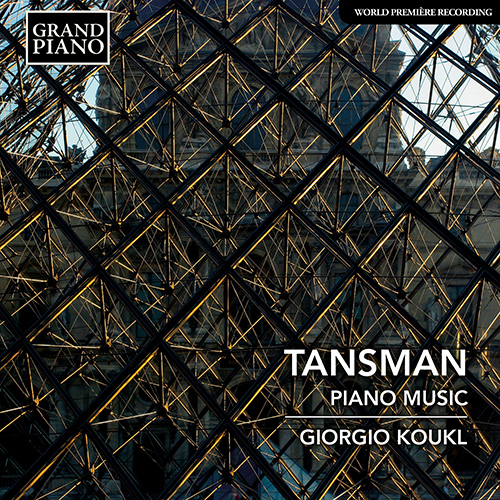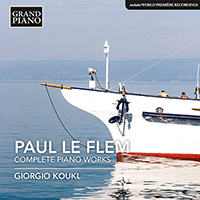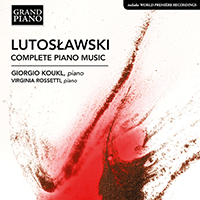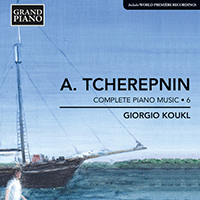
About this Release
“It has been a pleasure to dig into the apparently bottomless treasure of never-played works of Alexander Tansman. A man of the world, yet bound with intimacy to his Polish origins, to his Parisian world and most of all to his Jewish roots, he was able to transform all these influences into something unique far better than any other composer. Unjustly neglected for far too long, his work is now on the rise and being rediscovered. I am happy to contribute to this rediscovery with the hope it will become a part of the piano repertoire.” — Giorgio Koukl
TANSMAN, ALEXANDRE (1897–1986)
Piano Music
- Giorgio Koukl, piano
The career of Polish composer Alexandre Tansman flourished in Paris after the First World War, though it’s only in recent years that it has begun to be explored in depth on disc. A refined but spiritually engaged neo-Classicism remained a constant feature of his music-making in Europe and in his temporary American exile, whether in the beautifully evocative travelogue Visit to Israel or in the clarity of the Interludes and Caprices.
This recording was made on a modern instrument: Steinway, Model D
Tracklist
|
11 Interludes (1955) (00:14:00 )
|
|
1
No. 1. Moderato * (00:01:47)
|
|
2
No. 2. Allegro giusto * (00:01:05)
|
|
3
No. 3. Lento * (00:01:23)
|
|
4
No. 4. Andante * (00:01:11)
|
|
5
No. 5. Allegro con brio * (00:01:17)
|
|
6
No. 6. Moderato * (00:01:11)
|
|
7
No. 7. Allegro con moto * (00:01:19)
|
|
8
No. 8. Lento * (00:01:50)
|
|
9
No. 9. Andante sostenuto * (00:00:48)
|
|
10
No. 10. Moderato * (00:00:46)
|
|
11
No. 11. Allegro moderato ma deciso * (00:01:13)
|
|
Hommage à Arthur Rubinstein (1973) (00:04:00 )
|
|
12
Tempo di Mazurca * (00:02:01)
|
|
13
Toccata * (00:02:24)
|
|
2 Pièces hébraïques (1955) (00:09:00 )
|
|
14
No. 1. Invention * (00:06:42)
|
|
15
No. 2. Berceuse juive * (00:02:29)
|
|
4 Piano Moods (1944) (00:05:00 )
|
|
16
No. 1. Andante cantabile * (00:00:58)
|
|
17
No. 2. Vivace * (00:01:02)
|
|
18
No. 3. Lento * (00:01:22)
|
|
19
No. 4. Allegro meccanico * (00:01:12)
|
|
Prélude et Toccata (1943) (00:05:00 )
|
|
20
Prélude: Andante sostenuto * (00:01:46)
|
|
21
Toccata: Allegro molto * (00:03:22)
|
|
6 Caprices (1941) (00:08:00 )
|
|
22
No. 1. Allegro ben ritmato * (00:01:40)
|
|
23
No. 2. Moderato * (00:01:48)
|
|
24
No. 3. Lento * (00:02:33)
|
|
25
No. 4. Molto vivace * (00:00:34)
|
|
26
No. 5. Andante cantabile * (00:01:50)
|
|
Visit to Israel (1958) (00:13:00 )
|
|
27
I. Notturno: The Mysterious City of Sefad * (00:01:09)
|
|
28
II. The Kibbutz * (00:01:01)
|
|
29
III. The Ruins of Capernaum * (00:01:06)
|
|
30
IV. The Sources of the River Jordan * (00:00:52)
|
|
31
V. The Holy City (The Seven-armed Candelabra) * (00:01:52)
|
|
32
VI. The Desert of Negev * (00:01:40)
|
|
33
VII. The Mosque of Saint Jean d'Acre * (00:00:59)
|
|
34
VIII. The Lake of Tiberias * (00:01:16)
|
|
35
IX. Yemenite Cradle Song * (00:02:00)
|
|
36
X. Popular Dance (Hora) * (00:01:17)
|
|
37
Étude (Studio per pianoforte) (1967) * (00:06:47)
|
The Artist(s)
 Giorgio Koukl is a Czech pianist/harpsichordist and composer. He studied at both the Conservatories of Zürich and Milan, where he took part in the masterclasses of Nikita Magaloff, Jacques Février, and Stanislaus Neuhaus, and with Rudolf Firkušný, friend and advocate of Czech composer Bohuslav Martinů. It was through Firkušný that Koukl first encountered Martinů‘s music, and is now considered one of the world’s leading interpreters of Martinů‘s piano music. As a logical continuation of this work, Koukl has recorded the complete solo piano works of Paul Le Flem, Alexander Tcherepnin, Arthur Lourié, Vítězslava Kaprálová, Witold Lutosławski, and more recently, Alexandre Tansman and Tibor Harsányi.
Giorgio Koukl is a Czech pianist/harpsichordist and composer. He studied at both the Conservatories of Zürich and Milan, where he took part in the masterclasses of Nikita Magaloff, Jacques Février, and Stanislaus Neuhaus, and with Rudolf Firkušný, friend and advocate of Czech composer Bohuslav Martinů. It was through Firkušný that Koukl first encountered Martinů‘s music, and is now considered one of the world’s leading interpreters of Martinů‘s piano music. As a logical continuation of this work, Koukl has recorded the complete solo piano works of Paul Le Flem, Alexander Tcherepnin, Arthur Lourié, Vítězslava Kaprálová, Witold Lutosławski, and more recently, Alexandre Tansman and Tibor Harsányi. The Composer(s)
 Few composers in the twentieth century have such an exceptionally far-ranging career as Alexandre Tansman. Born in Poland in 1897 at Łódź, also the birthplace of his friend, the pianist Arthur Rubinstein, Tansman studied at the conservatory there and in Warsaw. He had as a fellow student the famous conductor and composer Paul Kletzki, who, as a violinist, took part in the first performance of Tansman’s now lost Piano Trio No. 1 and later conducted also in Paris his Fifth Symphony [Marco Polo 8.223379]. After winning in 1919 the three first prizes in the national composition competition organized in the newly established Polish Republic, Tansman settled in Paris, where he had the support and encouragement of Ravel and Roussel.
Few composers in the twentieth century have such an exceptionally far-ranging career as Alexandre Tansman. Born in Poland in 1897 at Łódź, also the birthplace of his friend, the pianist Arthur Rubinstein, Tansman studied at the conservatory there and in Warsaw. He had as a fellow student the famous conductor and composer Paul Kletzki, who, as a violinist, took part in the first performance of Tansman’s now lost Piano Trio No. 1 and later conducted also in Paris his Fifth Symphony [Marco Polo 8.223379]. After winning in 1919 the three first prizes in the national composition competition organized in the newly established Polish Republic, Tansman settled in Paris, where he had the support and encouragement of Ravel and Roussel. Reviews

“The brilliant technique of the pianist, paired with resonant sound, remarkable precision and an acute sensibility to rhythm, is particularly suited to the aesthetics of the “École de Paris”. After the excellent complete recordings of Martinů and Tcherepnin, Koukl follows with Tansman, another great figure of this group. This music of clear pianistic generosity does not lack depth at all, despite the brevity of each piece, and lets us appreciate the genius of the composer.” – Classica

“This disc was an absolute joy to listen to and will be welcomed by lovers of piano music everywhere.” – MusicWeb International




 Grand Piano has gained a reputation for producing high quality recordings of rare keyboard gems. Dedicated to the exploration of undiscovered piano repertoire, the label specialises in complete cycles of piano works by many lesser-known composers, whose output might otherwise have remained unknown and unrecorded.
Grand Piano has gained a reputation for producing high quality recordings of rare keyboard gems. Dedicated to the exploration of undiscovered piano repertoire, the label specialises in complete cycles of piano works by many lesser-known composers, whose output might otherwise have remained unknown and unrecorded.






